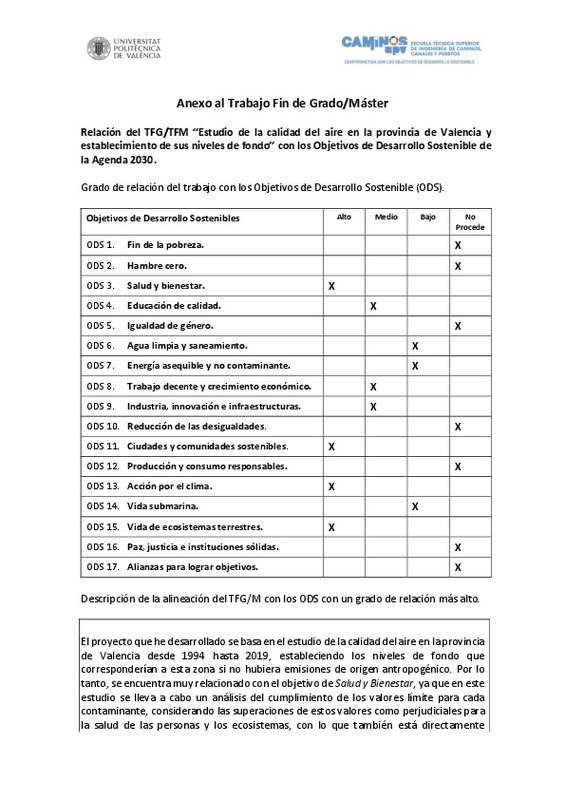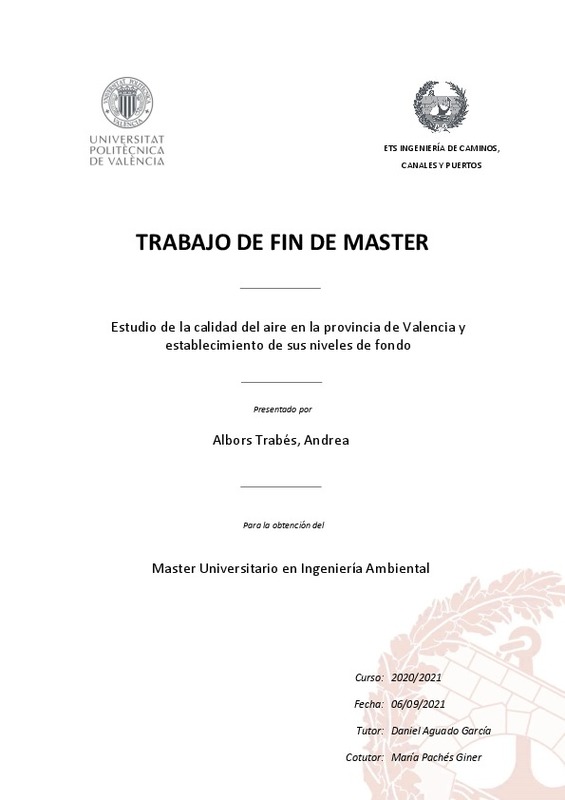|
Resumen:
|
[ES] En este trabajo se evaluará la calidad del aire en la provincia de Valencia a partir de los datos presentes en la web de la Red de Vigilancia y Control de la Contaminación Atmosférica (RVVCCA) y se establecerán sus ...[+]
[ES] En este trabajo se evaluará la calidad del aire en la provincia de Valencia a partir de los datos presentes en la web de la Red de Vigilancia y Control de la Contaminación Atmosférica (RVVCCA) y se establecerán sus niveles de fondo. Para ello se plantea la consecución de los siguientes objetivos específicos:
1. Revisión bibliográfica de estudios de calidad del aire en la provincia de Valencia
2. Estudiar la evolución temporal de los contaminantes
3. Comprobar para cada contaminante si cumple o no la legislación (en qué periodos cumple y en qué periodos no).
4. Analizar los principales contaminantes por zonas y tipo de estación (urbana, suburbana y rural; fondo, tráfico e industrial).
5. Determinación de los contaminantes más frecuentes y relación entre ellos.
6. Establecimiento de los niveles de fondo.
7. Analizar la relación que existe entre la localización y los niveles de concentración.
8. Examinar las posibles relaciones con las variables meteorológicas (lluvia, temperatura, viento, ¿).
Para ello tras conseguir los datos (del período 1994-2019) de la RVVCCA recogidos en la normativa vigente (Directiva 2008/50/CE, relativa a la calidad del aire ambiente y una atmósfera más limpia, y su transposición la ordenamiento jurídico Español mediante el R.D. 102/2011, de 28 de enero, relativo a la mejora de la calidad del aire) se creará una base de datos donde se agruparán todas las variables y se diferenciarán por estación, año y tipo de contaminante. Posteriormente se analizarán los niveles de inmisión y sus respectivos valores límite, lo que permitirá conocer si se cumple de la legislación vigente y el índice de calidad del aire. Por otra parte, se estudiará la evolución temporal de los contaminantes, se analizarán los principales contaminantes por zonas y tipos de estación, los contaminantes más frecuentes, la relación existente entre su localización y los niveles de concentración y el establecimiento de los niveles de fondo.
[-]
[EN] In this work, the air quality in the province of Valencia will be evaluated from the data present on the website of the Atmospheric Pollution Surveillance and Control Network (RVVCCA) and its background levels will ...[+]
[EN] In this work, the air quality in the province of Valencia will be evaluated from the data present on the website of the Atmospheric Pollution Surveillance and Control Network (RVVCCA) and its background levels will be established. For this, the achievement of the following specific objectives is proposed:
1. Bibliographic review of air quality studies in the province of Valencia
2. Study the temporal evolution of pollutants
3. Check for each pollutant whether it complies with the legislation (in which periods it complies and in which periods it does not).
4. Analyze the main pollutants by zone and type of station (urban, suburban, and rural; background, traffic and industrial).
5. Determination of the most frequent pollutants and the relationship between them.
6. Establishment of background levels.
7. Analyze the relationship between location and concentration levels.
8. Examine the possible relationships with meteorological variables (rain, temperature, wind, ...).
For this, after obtaining the data (from the period 1994-2019) of the RVVCCA collected in the current regulations (Directive 2008/50 / CE, relative to ambient air quality and a cleaner atmosphere, and its transposition into the Spanish legal system through RD 102/2011, of January 28, relative to the improvement of air quality) a database will be created where all the variables will be grouped and will be differentiated by season, year, and type of pollutant. Subsequently, the immission levels and their respective limit values will be analyzed, which will allow to know if the current legislation and the air quality index are being complied with. On the other hand, the temporal evolution of pollutants will be studied, the main pollutants will be analyzed by zones and types of seasons, the most frequent pollutants, the relationship between their location and concentration levels and the establishment of background levels.
[-]
|








